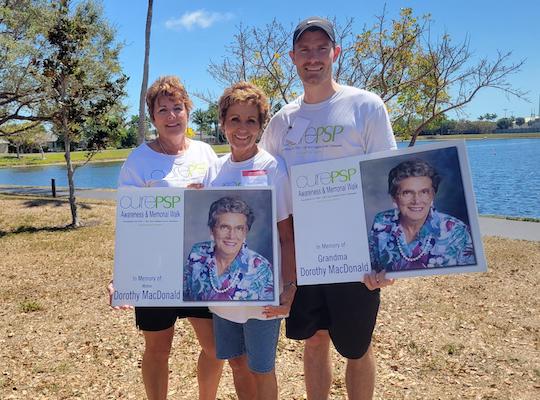CurePSP Launches Groundbreaking Genetics Program, Pioneering New Frontier in PSP, CBD and MSA Research
Feb 11, 2025 Oscar Sullivan
CurePSP has taken a critical step towards addressing knowledge gaps in PSP, CBD and MSA research through the launch of the CurePSP Genetics Program in fall 2024. This nationwide initiative seeks to increase our understanding of these diseases through the participation of CurePSP’s community members throughout the United States. People living with PSP, CBD and MSA will have the unique opportunity to not only contribute to future discoveries, but also receive test results that may help in their disease journey. By collecting genetic samples, researchers are hoping to learn about the underlying causes of these diseases, which can help them better treat these diseases, and eventually, hopefully, find a cure. In an innovative setup, certified phlebotomists are collecting blood samples directly from people’s homes, signaling a new frontier in patient-centered research.
Research focused on the genetics of atypical parkinsonian disorders, including PSP, CBD and MSA, has historically been limited in scope. Momentum began growing in March 2023 when the Global Parkinson’s Genetics Program (GP2) expanded its funding to explore the genetic architecture of Parkinson’s disease—explicitly incorporating PSP, CBD and MSA—beginning a noticeable shift toward a more international and scaled approach. Anne-Marie Wills MD MPH, a Neurologist at Massachusetts General Hospital (MGH) and Director of the CurePSP Center of Care at MGH, found this particularly compelling given her extensive background in genetics research. She previously worked in Dr. Robert Brown’s lab where he discovered the SOD1 gene, the first gene found to cause ALS, in 1993.
“SOD1 really put ALS on the map,” Dr. Wills said. “Before that, people thought that it was completely incurable and too rare and unknown to even understand or study. And so the discovery of the first ALS gene really changed people's attitudes towards it.”
Dr. Wills recognized the opportunity to finally apply those same efforts to PSP, CBD and MSA, approaching Kristophe Diaz, CurePSP Executive Director and Chief Science Officer, at Neuro2023: The PSP and CBD International Research Symposium about the possibility of a nationwide genetics program that would offer an unprecedented number of DNA samples for research. It took eleven months to create the steering committee, set up the collaborations with Dr. Sonja Scholz at the NIH, design the protocol and obtain IRB approval, before CurePSP unveiled the Genetics Program. Dr. Scholz’s lab has a particular interest in studying the genetic architecture of neurodegenerative diseases such as PSP, CBD and MSA, as she is motivated by the way that neurogenetics has already revolutionized how we think about common neurodegenerative diseases, such as Alzheimer's disease and Parkinson's disease, and hopes to apply those same techniques to rarer conditions. This milestone was also made possible through the generous support of two philanthropic families, whose commitment to accelerating genetic research has provided crucial resources in driving this initiative forward.
“I knew that if we could get the DNA samples, then we can get them sequenced efficiently and cost-effectively,” Dr. Wills said.
Researchers have been working tirelessly for genetic clues surrounding PSP pathology, with the strongest lead thus far being the discovery of the MAPT gene mutation as an indicator of disease risk found more than twenty years ago, lending credence to the idea that genetics plays a role in these diseases. Researchers still have a murky picture of the genetics of these conditions, and hope that the increased accessibility of sequencing will unlock new genetic insights. By recruiting participants directly and sending phlebotomists to their homes, the CurePSP program will be able to collect more DNA samples than any previous initiative. They will also be enrolling families from anywhere in the United States, allowing them to put together the DNA of families where multiple people are affected, making it much more likely to find a disease-causing mutation. The program will be the first and largest database that can enroll people with PSP, CBD and MSA remotely.
The project takes inspiration from a similar initiative for Parkinson’s Disease, “PD GENEration: Mapping the Future of Parkinson’s Disease,” (Dr. Wills is a part of the steering committee). She hopes that this will allow PSP, CBD and MSA research to catch up to Parkinson’s, which has identified GBA and LRRK2 mutations as common causes of Parkinson’s disease. Much like cancer which has many targeted therapies for genetic mutations, GBA and LRRK2 targets for Parkinson’s disease are now in development.
“I’m hoping that we can catch up to ALS and Parkinson's genetic research,” Dr. Wills said, “where we have a good group of genes that we think are pathogenic and tell us something about the causes of the disease and the pathways involved, and that could be targets for clinical trials in the future.”
The organizers also have hopes of expanding the program to other countries, including Canada and Mexico and potentially other Latin American countries in the future, similar to how “PD GENEration” has grown over time. For now, Dr. Wills and organizers remain focused on collecting US-based samples, from as far away as Hawaii. Chinyere Obasi, a Clinical Research Coordinator working within Dr. Wills’ lab at MGH and on the CurePSP Genetics Program, says that the overwhelming demand has led to a whirlwind of positive emotions. He understands that those affected have been eagerly awaiting programs like this, and hopes to deliver them the results that they deserve.
“I’m very excited that we’ve had this much interest,” Obasi said. “People seem to be not just interested, but willing to engage in this work.”
By enrolling, eligible participants will have the opportunity to learn more about their illnesses while also increasing the research community’s understanding of these diseases. If a genetic variant is found in their sample, they will be contacted by the team to get a second sample to confirm the finding. Participants will be able to learn more about the gene variants through an appointment with a genetic counselor who will walk them through the results of their genetic test and answer any questions they may have. There is hope that positive results may eventually allow participants to be eligible for targeted clinical trials, signaling a future where PSP, CBD and MSA are given the attention that they deserve.
To learn more about how to be a part of The Genetics Program, click here.
Para español, clic aquí.
Join our email list
Get the latest news and resources
directly to your inbox.
Get the latest news and resources directly to your inbox.
Sign Up.jpg)

.png)

